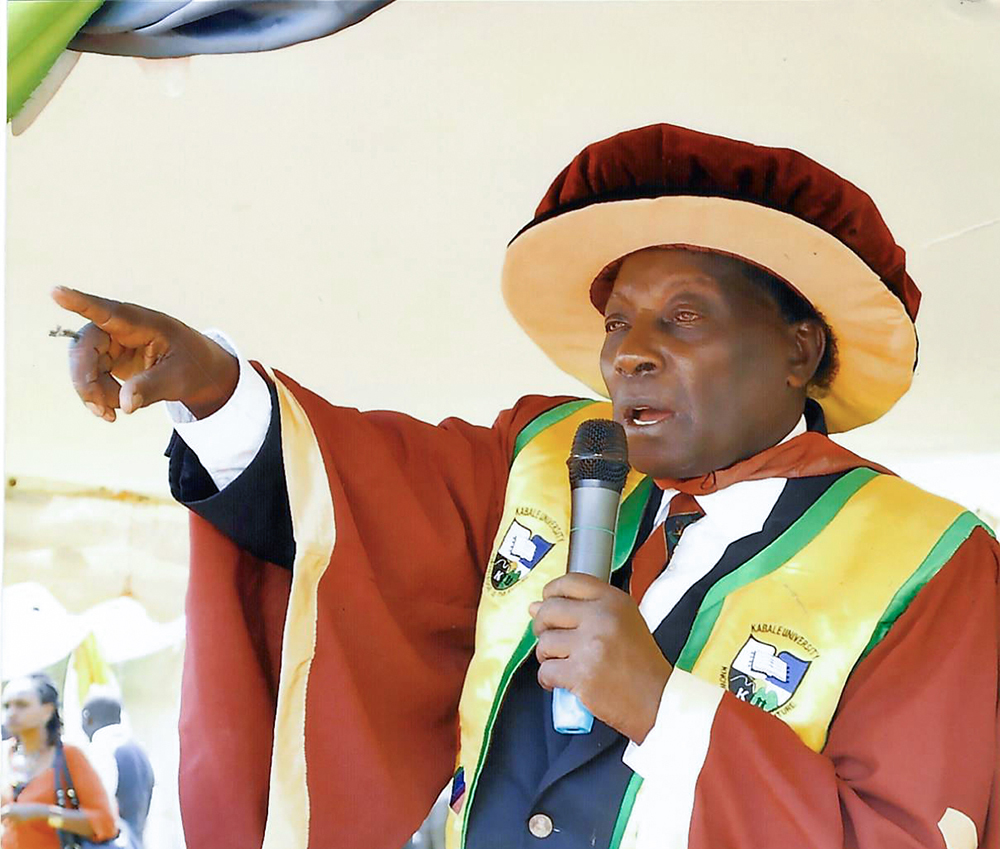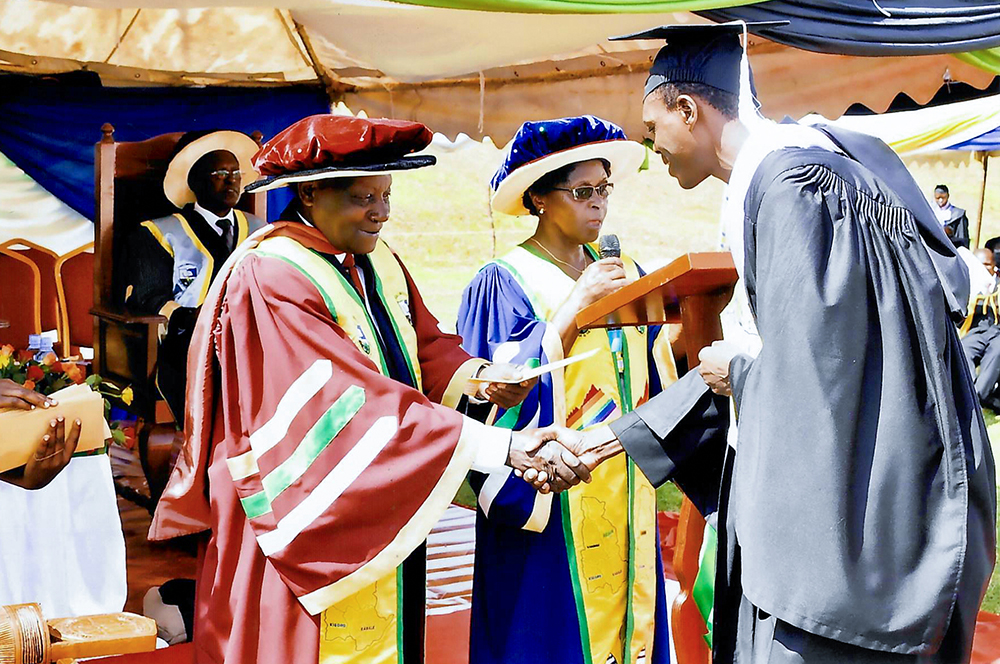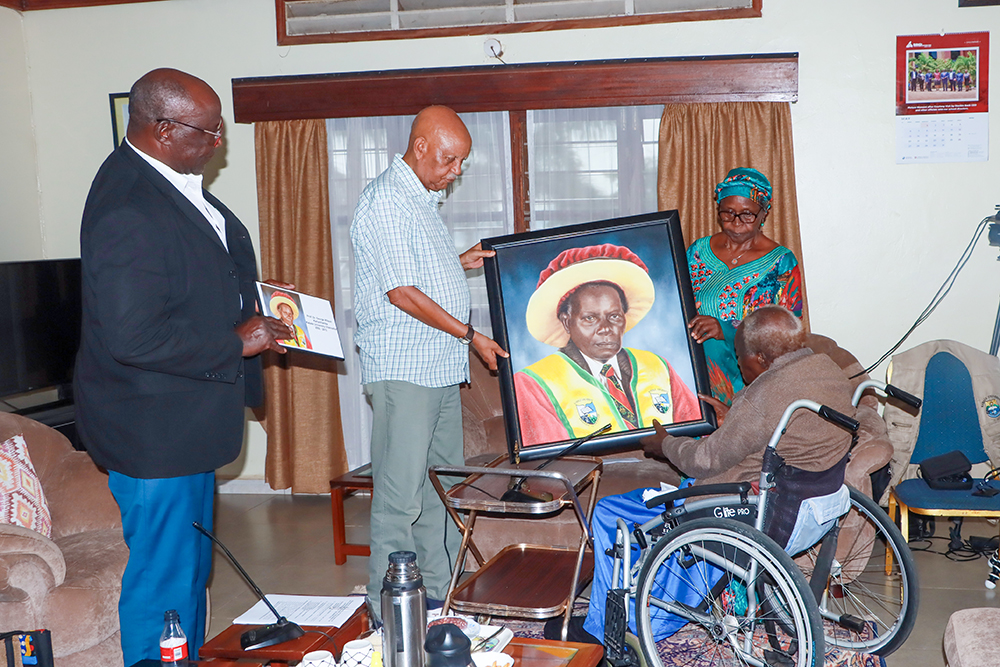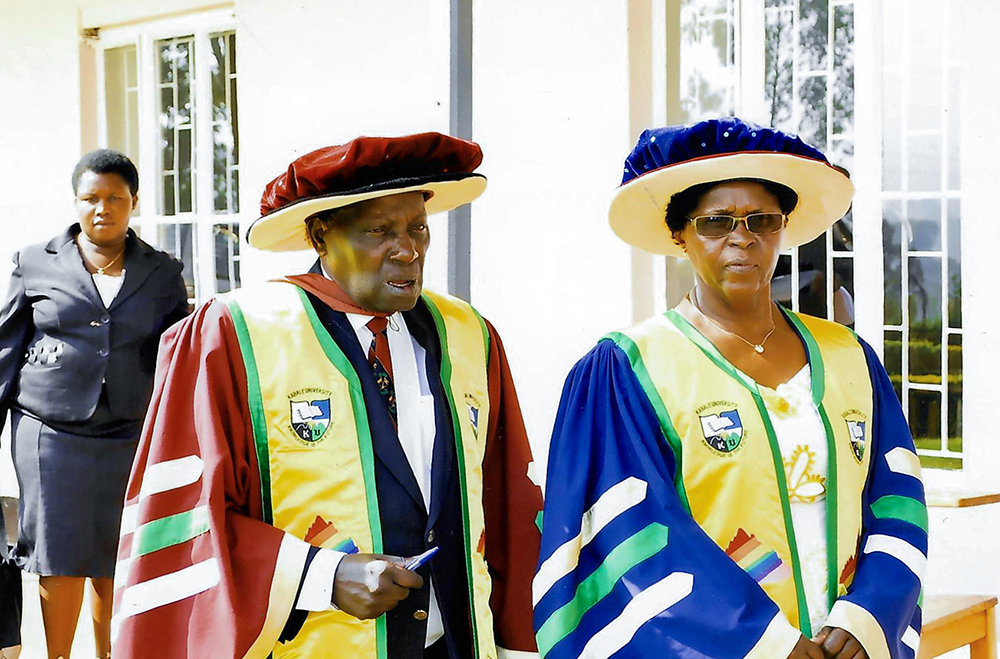Professor George Wilson Kanyeihamba: The other side
Professor Kanyeihamba was determined to deliver, despite the very clearly fragile financial status of the institution then. He was involved in the initial fundraising drives to start off the University, where he contributed generously. Along with Prof. E. Tumusime Mutebile and Dr Joseph Byamugisha, Prof. Kanyeihamba offered to top up the Vice Chancellor’s salary – which they did for some time.
Professor George Wilson Kanyeihamba: The other side
By Admin .
Journalists @New Vision
___________
TRIBUTE
By Professor Joy C. Kwesiga
I got to know Professor George Wilson Kanyeihamba long before I became Vice Chancellor of Kabale University. This was through my late husband, Professor Jassy B. Kwesiga. They had been to the same primary school in Rubanda and to Busoga College Mwiri. They reconnected when the latter went for further studies in the United Kingdom, and when Prof. Kanyeihamba and his family returned to Uganda. We kept his wide collection of books when he had to go into exile in the 1970s.
When Professor Kanyeihamba persuaded me to leave my job at Makerere University and become Vice Chancellor of Kabale University in 2005, I thought I was mentally ready to take up the task. However, I had not done due diligence with regard to the leaders I would be working under. Professor Kanyeihamba pleaded that he had engaged three Vice Chancellors within a very short spell, but they had not all settled into building the University.
The National Council for Higher Education had just denied the grant of an operational licence to Kabale University. The apex governance body, the Assembly of Promoters, was chaired by the Rt. Hon. Dr Ruhakana Rugunda. Prof. Kanyeihamba was then the Chairperson of the Board of Trustees, and soon after, he became the Chancellor. Justice Amos Twinomujuni (RIP) became the Chair of the Board of Trustees. Dr Joseph Byamugisha (RIP), a renowned lawyer, was the Chair of the University Council. There were an additional two or three lawyers on these organs of the University.
Anyone who knows these senior lawyers can easily imagine the modus operandi of the day. These individuals rarely agreed to any suggestion introduced by any one of them, so much so that on several occasions, it took the tactical and diplomatic traits of Professor Emmanuel Tumusime Mutebile (RIP) (Chief Fundraiser), to bring them to order. On my part, and as a lay person, I began to ponder the legal profession. Could it be the curriculum that lacked exposure to the appreciation of the realities of daily life?
Despite their frequent reference to the importance of human rights, was there any occasion at all when the law took on a human face in their midst? Could it be the training methodology that led to the seemingly “one-track direction” that was observable in each of them, as far as I could tell? What made them appear to me (and to my colleagues) to be acting as if they were permanently in a court of law?
What made Professor Kanyeihamba stand out in all these processes, is that whenever there were disagreements he would reflect on the issues under discussion and later give me a telephone call to say: “Let us forget what happened and work together to build Kabale University”. Because I too was convinced that I was capable of causing change in the higher education landscape within the Kigezi region, I decided to settle down and work with the many people that populated all these numerous governance organs of the University, led by Professor Kanyeihamba.
Since his passing on July 7, 2025, many eulogies have focused on his life as a scholar, a distinguished judge, a leader and a politician, but mainly from the legal perspective. A lot has been said about his character, especially his traits of assertiveness, truth-telling, courage and bravery, stubbornness, and so on, but again, as reflected through his legal professional life. Ugandans, and those beyond, who have followed the life of Kanyeihamba through his writings, his public pronouncements and his actions, may not appreciate the Kanyeihamba “outside of the legal profession”. This is what I wish to highlight below.
Kanyeihamba, the institution builder: Kabale University was established as a community institution, owned by the people of Kigezi. Prof. Kanyeihamba was one of the key founder members who planned for its establishment.
Thereafter, he endeavored to give the University a credible foundation, through varied strategies. He focused on the quality of service from the beginning, especially the human resources. Though not directly involved in the day-to-day running of the University, whenever he met any member of staff in the corridors, he would ask about their professional qualifications – and, typical of him, he would be sure to pronounce himself on whether that person should be in the university or needed further training.
Professor Kanyeihamba was determined to deliver, despite the very clearly fragile financial status of the institution then. He was involved in the initial fundraising drives to start off the University, where he contributed generously. Along with Prof. E. Tumusime Mutebile and Dr Joseph Byamugisha, Prof. Kanyeihamba offered to top up the Vice Chancellor’s salary – which they did for some time.
Whenever “things became tight”, he would pitch in and save the University. For example, he insisted that the University must consistently hold regular annual graduation ceremonies, to the extent that he at one time used his personal funds to pay for the publication of the Graduation Booklet.
Unlike many, he looked ahead to the time the University would expand and, consequently, he put up a spirited fight to legally acquire the 100 acres of land that the Kabale District Local Government had promised to relinquish to the University. These efforts included taking the Local Government to court. Unfortunately, he has gone before realizing this dream, but we take note of the fact that even after he had been taken ill, he kept referring to his wish to get the entire Kikungiri Hill to become the Kabale University Campus.
Professor Kanyeihamba created time for the University, and was willing to be engaged, be it in his chambers, at his home in Kampala, or in Kabale town; and, if necessary, he would travel to the Campus. Several times, he physically visited the National Council for Higher Education offices in order to understand what the University should do to attain the set standards.
Like all the other promoters, Kanyeihamba performed all these tasks voluntarily: each member met their personal expenses. Kanyeihamba indeed expressed displeasure when in subsequent years, the Council resolved to draw some allowances. 
Professor George Wilson Kanyeihamba. (Courtesy)
Kanyeihamba, the institutional leader: Authoritative, ethical, revered, principled and empathetic: When Professor Kanyeihamba, the Chancellor, was in the house, everyone knew it. In his presence, everyone listened. He was sure to leave a mark each time he came to perform the duties of Chancellor. This could be through the lessons he gave to staff, students, parents and the general public, say at graduation ceremonies. He would correct staff in particular situations, when necessary, and many still speak of how they became more time-conscious because of him.
Others say they learned to pay more meticulous attention to their work, especially the written word, because Kanyeihamba could not help but point out any misuse of words.
We all learned something from the systematic order in which he listed his many well-earned academic and professional titles because he did not like having them presented randomly. He supported the Senate in instituting tough measures against students and staff who engaged in examination malpractices. It is no wonder that he often cited the benefit of sticking to one’s principles.
He would explain how while campaigning for election to represent the people of Rubanda in the Constituent Assembly, he refused to bend to people’s demands to buy them alcohol. In the end, they saw sense and voted for him without any such inducements. He therefore always taught, guided and mentored in such a manner that one kept thinking about his words. The message always sank.
One outstanding attribute of his that is not normally pointed out was the level of his empathy towards the student community. As a rural-based institution with very limited resources, Kabale University had to take stern measures to make students pay their dues. Many resource-poor parents would fail to raise the money.
Consequently, students would be prevented from sitting for their examinations. This was meant to encourage them to search for this money in good time.
However, because they came to learn that the Chancellor was sympathetic to their cause, all that the students needed to do was to give him a call. He would then ring any member of Management and request that students be allowed to sit their examinations, as the University could withhold their results. For his stand to change, we had to plead with him to appreciate our position because the University was getting more and more indebted.
As an educator, he wished for every young person to go to school, and that is why he used his personal resources to build a hostel for students at Nyaruhanga Secondary School, his former school, in order to improve their learning conditions. At Kabale University, he encouraged us to put in place a policy on Private Public Partnerships because he had the intention to build a student hostel on Kikungiri Hill.

Professor George Wilson Kanyeihamba (left) congratulating a graduate during the university's graduation ceremony. (Courtesy)
Kanyeihamba, as a man who valued his cultural heritage. Prof. Kanyeihamba was a proud Mukiga man. He fondly spoke of his constrained childhood journey and the lessons he learned. In his jolly times, he would play the local harp (“enanga”) and tell educative stories to his audience. The importance he placed on his culture extended to the Kikiga cuisine – including the “empengyere” dish (a mixture of maize and beans), and the well-prepared “obushera” beverage. It was this love for his culture that made him push for a better Kigezi.
He tried to participate in every possible Kigezi-promoting organisation, including the International Community of Banyakigezi (ICOB), Uganda Chapter, for which he voluntarily drafted the Constitution. Space does not allow for other examples, but his desire to see Kigezi develop can be illustrated by his selfless, far-reaching efforts to save the Kigezi Bank of Commerce from dissolution. Sadly, the fate of this originally well-intentioned initiative turned out to be unavoidable.
Kanyeihamba, the hospitable host: Prof. Kanyeihamba was an excellent host. He often invited Kabale University leadership to his home to discuss matters of concern. He himself would serve the drinks.
On two occasions, he personally cooked the special dishes of beef and chicken. He also liked to entertain young folks. On some weekends, he would invite children of his friends, serve them sumptuous meals, show them interesting documentaries, teach them table manners, and encourage them to study. The Kwesiga girls have fond memories of such occasions at their Buziga home.
One of the stories he loved to tell on such occasions was what he described as his early exposure to corruption. As pupils of Nyaruhanga Primary School, he and Jassy B. Kwesiga used to earn money during the school holidays by trapping and killing “efukuzi” (moles) in the government-protected Mafuga Forest Reserve in present-day Rubanda District. Payment was according to how many moles you showed to the Mzungu supervisor. But because the supervisor did not collect the dead moles, the pupils learned to recycle them in order to earn more money.

(Courtesy)
Kanyeihamba the noble gentleman: As someone who at one time worked under the supervision of Prof. Kanyeihamba, the one lasting lesson I learned from him was his willingness to own up where he might have not acted right, and to seek for forgiveness. Again, because of space, I will illustrate this with just one example.
One afternoon in November 2023, Professor Kanyeihamba rang me. This was a surprise because as those who know the history of Kabale University are aware, Prof. Kanyeihamba, unlike me and a good number of others, was opposed to the University becoming a public university.
A group that agreed with him took the University to court, seeking a judicial review. In the end, Kabale University became a public university through Statutory Instrument 2015 No. 36 on July 16, 2015. Prof. Kanyeihamba, in his own words, said: “Joy, I am calling to say sorry and to ask for forgiveness. I know I was wrong. I was wrong. Please, let bygones be bygones. Forgive me”.
He went on to invite me and my family to his very well advertised thanksgiving ceremony on December 31, 2023, at Namirembe Cathedral, which I attended. On that day, I had written a reconciliatory speech, which I could not deliver. However, he subsequently printed it in his last book titled: Kanyeihamba at His Best.
This was a turning point. The Management of the University facilitated the people from Rubanda to attend the thanksgiving ceremony in Kampala. The University leadership, led by Chancellor Prof. George Mondo Kagonyera, subsequently paid a special visit to him later at Buziga. He donated more books tothe Kabale University Library. By the time of his passing, Professor G. W. Kanyeihamba, I (Professor Joy Kwesiga), and all the Organs of Kabale University were at peace. All is well that ends well!
Kabale University community mourns the passing of a key founder. The strong bricks he laid on the foundation and the walls of Kabale University will remain forever. He never stopped dreaming about the growth of the University, and in his latest book, he states his wish to see Kabale University thrive and thrive and thrive. The co-founders of Kabale University have always expressed profound appreciation for what he did while at the steering wheel.

(Courtesy)
I appreciate Professor Kanyeihamba for selecting me to contribute to the construction of Kabale University. He did this single-handedly, after getting assurances from a few colleagues, including his childhood friend, my late husband, that I was up to the task. He reinforced my resilience, my determination, and put to the test my capacity to venture into the unknown. He allowed me to grow, even after my statutory retirement age.
Undoubtedly, Professor Kanyeihamba was patriotic to Kabale University, to the Kigezi region, and to Uganda.
My deepest condolences go to his family. However, the loss is to all of us, as a community, and as a country.
May his soul rest in eternal peace.
Knowledge is the future
For God and my Country.
The writer is the Vice Chancellor, Kabale University
